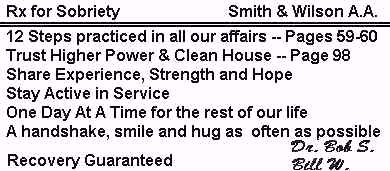


Click The Images To Go To Page Indicated In The Flag
What About Members With Longer-term Sobriety?
Excerpted from Akron Intergroup News, December 1998
For all the good and right reasons, we pay a lot of attention to AA newcomers. They are the lifeblood of our fellowship, and tradition says they are the primary reason we have meetings. But what about members with longer-term sobriety?
We're taught that the seeds of relapse are found in attitudes which precede the actual picking up of that first drink.
While these might be easier to spot with new people, they seem much more difficult to detect in our friends with longer-term sobriety.
Telling a new AA member to call us before picking up the first drink is excellent advice. But it almost never works for those who no longer have deep cravings for alcohol, because in a subtle, insidious way, they have entered into a private period (weeks, maybe even months) of irrational thinking about their lives, work, this program, loved ones, hobbies, the government or other drivers!
In other words, a dangerous form of alcoholic insanity has emerged. With nothing in its path to prevent it, drinking is the natural, instinctive reaction. Fortunately, we have ways to prevent this from happening. The bond of trust we establish between each other in AA is a powerful ally. If we confront those fellow members closest to us suspected of having difficulties, and if we do this with compassion and a willingness to listen and help in a true 12th Step Spirit, the outcome may be lifesaving. Following is a checklist of relapse symptoms we can watch for - and help a troubled friend explore in a sort of short-form 4th and 5th Step process.
- Exhaustion - Allowing oneself to become overly tired; usually associated with work addiction as an excuse for not facing personal frustrations.
- Dishonesty - Begins with pattern of little lies; escalated to self-delusion and making excuses for not doing what's called for.
- Impatience - I want what I want NOW. Others aren't doing what I think they should or living the way I know is right.
- Argumentative - No point is too small or insignificant not to be debated to the point of anger and submission.
- Depression - All unreasonable, unaccountable despair should be exposed and discussed, not repressed: what is the "exact nature" of those feelings?
- Frustration - Controlled anger/resentment when things don't go according to our plans. Lack of acceptance. See #3.
- Self-pity - Feeling victimized, put-upon, used, unappreciated: convinced we are being singled out for bad luck.
- C÷ckiness - Got it made. Know all there is to know. Can go anywhere, including frequent visits just to hang-out at bars, carry out's, boozy parties.
- Complacency - Like #8, no longer sees value of daily program, meetings, contact with other alcoholics, (especially sponsor!), feels healthy, on top of the world, things are going well. Heck may even be cured!
- Expecting too much of others - Why can't they read my mind? I've changed, what's holding them up? If they just do what I know is best for them? Leads to feeling misunderstood, unappreciated. See #6.
- Letting up on disciplines - Allowing established habits of recovery - meditations, prayer, spiritual reading, AA contact, daily inventory, meetings - to slip out of our routines; allowing recovery to get boring and no longer stimulating for growth. Why bother???!!!!
- Using mood-altering chemicals - May have a valid medical reason, but misused to help avoid the real problems of impending alcoholic relapse.
- Wanting too much - Setting unrealistic goals: not providing for short-term successes; placing too much value on material success, not enough on value of spiritual growth.
- Forgetting gratitude - Because of several listed above, may lose sight of the abundant blessings in our everyday lives. Too focused on # 13.
- "It can't happen to me." - Feeling immune; forgetting what we know about the disease of alcoholism and its progressive nature.
- Omnipotence - A combination of several attitudes listed above; leads to ignoring danger signs, disregarding warnings and advice from fellow members.
In other words, as stated on page 85 of the BigBook...
"It is easy to let up on the spiritual program of action and rest on our laurels. We are headed for trouble if we do, for alcohol is a subtle foe. We are not cured of alcoholism."

Love and Peace, Barefoot
Index of AA History Pages on Barefoot's Domain
As in so many things, especially with we alcoholics, our History is our Greatest Asset!.. We each arrived at the doors of AA with an intensive and lengthy "History of Things That Do Not Work" .. Today, In AA and In Recovery, Our History has added an intensive and lengthy "History of Things That DO Work!!" and We will not regret the past nor wish to shut the door on it!!
ABC Page 60 from the Big Book
KEEP COMING BACK!
ONE DAY AT A TIME!
 Barefoot's World
Barefoot's World

On the Web February 7, 2002 in the Spirit of Cooperation
Three mighty important things, Pardn'r, LOVE And PEACE and SOBRIETY






